Why USask Law
Earn your Juris Doctor (JD) degree in a welcoming, student-centered environment.
- Degree: Juris Doctor
- Length: 3 years
- Campus: Saskatoon
- Part-time option
- Non-direct entry program
Your USaskLaw experience
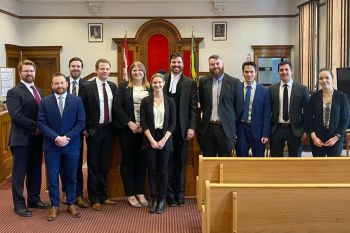
Hands-on learning outside the classroom
USask Law offers for-credit, supervised learning opportunities within our program, including a variety of practicum placements focusing on child protection law, criminal law, start-up law and beyond. These provide a bridge between classroom learning and hands-on experiences to help you begin to build your professional identity.
Supportive judicial and legal community
USask Law enjoys a collaborative relationship with our province's judiciary and the Saskatchewan bar. Current and former justices from the Court of King's Bench and judges from the provicnial court annually participate in week-long judge-in-residence programs at the college. They also play an integral role in welcoming students to their legal studies at the college's First-Year Welcoming Ceremony. Alumni maintain close ties to the college by sharing their expertise as sessional lecturers and serving as moot team coaches.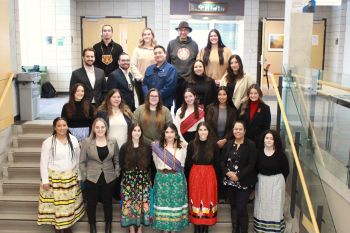
Longtime leadership in Indigenous Law
USask Law is home to the Indigenous Law Centre, founded 50 years ago. Its mission includes facilitating access to legal education for Indigenous people and promoting the development of the law and legal system in Canada in ways that better accommodate the advancement of Indigenous people. It is home to our college's cultural advisors and hosts events so students may meet practising Indigenous lawyers.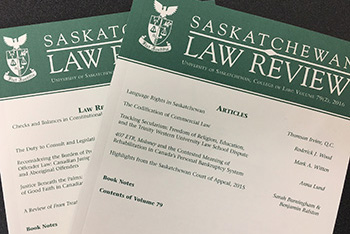
Saskatchewan Law Review
The Saskatchewan Law Review is a journal published at the College of Law and provides a range of opportunities for legal scholars and experts interested in publishing their work. As a student, you can submit work for review or serve on the editorial board.
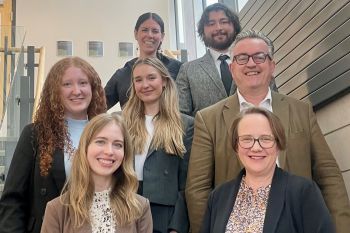
Dean's Forum on Access to Justice and Dispute Resolution
The Dean’s Forum on Access to Justice and Dispute Resolution is an important initiative that engages justice community stakeholders in Saskatchewan in a dialogue about access to justice and the future of the legal system. This course offers law students a unique opportunity to meaningfully and actively contribute to this consultation and policy development exercise.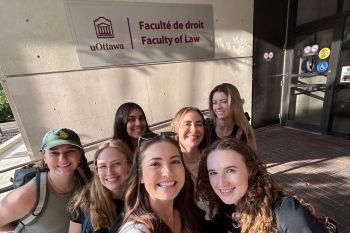
Certificate in French Common Law
This program offers students with French language skills the unique opportunity to obtain a University of Ottawa Common Law Certification in French upon completion of their three-year JD program. CCLF students go on exchange to Ottawa and participate in the Michel-Bastarache Moot Court Competition, and they complete a credited internship with lawyers who work in French.Mooting
Mooting is an important part of USask Law's academic and professional program. Students develop and present legal arguments and exercise their legal research and writing skills. All first-year students participate in a moot, while second- and third-year students apply annually for spots on USask Law teams that participate in regional and national moot competitions, testing their skills against teams from across the country.
Your career options
A Juris Doctor (JD) can take you almost anywhere. Of course, there is the traditional route of joining a legal practice, but in today's diverse and fast-paced job market, there are a multitude of less conventional options available to you as well.
PRACTISE LAW IN:
- Private law firms
- Government
- Legal aid clinics
- Corporations
PURSUE OTHER ROLES FIELDS SUCH AS:
- Policy advising
- International relations
- Real estate
- Counselling
- Mediation and arbitration
- Journalism
Career support
The Career Development Office provides a variety of services and hosts a multitude of events to ensure you find the career that is right for you. These include on-campus interviews with out-of-province firms specifically recruiting first- and second-year summer positions. We also host professional development seminars to enhance your professional skills and assist you with planning your career.
Estimated tuition and costs
| Canadian students | |
|---|---|
| Tuition | $18,309 |
| Fees | $1,308 |
| Tuition and fees | $19,617 |
| Books and other fees (approx) | $2,500 |
Housing is not included in your fees. On campus residence options are available.
Join a distinguished group of alumni
As an alumnus of the College of Law, you will be part of a lifelong community of graduates who have gone on to become, among other things, accomplished academics, learned members of the legal profession across the country, diplomats and political leaders. College of Law alumni have held the positions of Prime Minister of Canada, Governor General of Canada and Premiers of Alberta and Saskatchewan.
Study law at the U of S and become one of approximately 120 graduates to join our alumni family each year.
Ready to apply?
Applications open October 15, 2025 for classes beginning September 2026.
Approximately 126 students are accepted into the College of Law's first-year program at the Usask each academic year. However, the number of applications we receive greatly exceeds the number of seats available.
Admission to the College of Law is at the discretion of the college's Admissions Committee taking into account your academic record, Law School Admission Test (LSAT) score, and any other circumstances the committee deems relevant.
Past experience indicates that, as a general rule, successful applicants have an average of 84 % in pre-law studies, and score 159 or higher on the LSAT.
Admission qualifications
The minimum requirement to enter our JD program is two full years (60 credit units) of undergraduate academic work at a recognized university or equivalent. There are no recommended pre-law programs or classes.
Applicants must also submit a current LSAT score and personal statement (max. 500 words).
